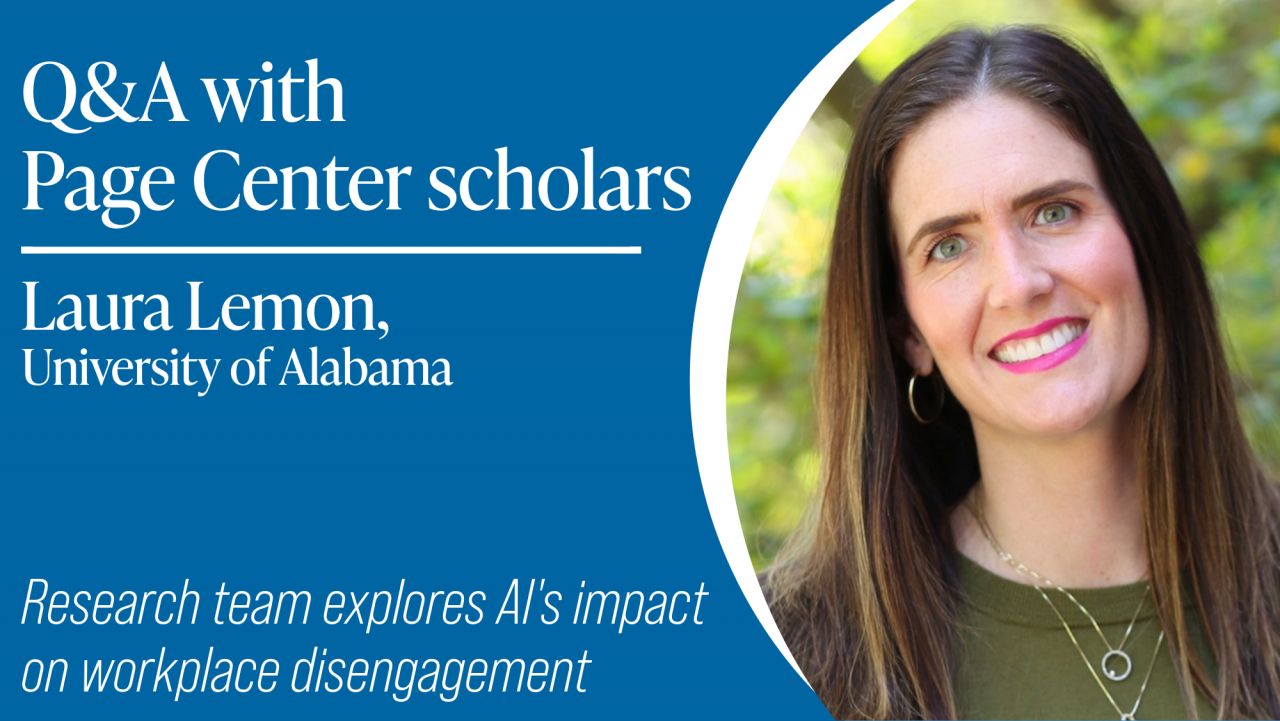July 15, 2025
Disengagement in the age of AI – Scholar Q&A with Laura Lemon

When employees withdrawal or detach themselves psychologically from their work, organizations may feel the repercussions. A team of Page Center scholars is conducting a two-phase study that will explore disengagement across different stakeholder groups. Three-time Page Center scholar Jordan Morehouse, University of Colorado-Boulder; and two-time scholars Laura Lemon, University of Alabama, and Yan Qu, University of Maryland are studying the phenomenon from a public relations perspective by focusing on how artificial intelligence tools may increase or decrease disengagement.
The project is part of the Page Center’s 2025 research call on the ethics of generative AI. In this Q&A, Lemon discusses the difference between engagement and disengagement and the team’s plan to build a framework for public relations professionals to handle disengagement issues.
Talk about your team. How did you get together for this project, and how does everyone fit?
The team really came together based on positive working relationships. We're colleagues, we're friends, and we have different skill sets. The leader of our team is Dr. Jordan Morehouse. She has a wealth of knowledge when it comes to looking at engagement, as well as applying and using social network analyses as a methodological tool. We also have Dr. Yan Qu who is our resident AI expert. He also studies public relations through a social network perspective. I specialize in employee engagement and qualitative methods. We have a really nice balance.
What happened first, the team or the research idea?
It was the topic, disengagement. I wrote a piece in 2024 in Public Relations Inquiry challenging public relations scholars to dedicate time and effort into looking at disengagement. Jordan had seen that piece, and she thought this might be a really cool way to look at AI – How are people disengaging in the workplace because of AI? I think Jordan handpicked both of us. She had the idea based on our expertise and brought us together.
So, what is disengagement all about in relation to AI and this project?
Broadly speaking, our project is looking at the potential connections between disengagement and AI. There's been an ample amount of scholarship looking at engagement as a critical paradigm in public relations. It's transcended many topics, many areas, but we don't see the same attention dedicated to disengagement – and there's implications for this.
What we're seeing is that employee disengagement is not necessarily the opposite of engagement. In one of the studies I did, we found that when people were doing the minimum that was expected of them for their job, they were considered to be disengaged. So, the only way to be an engaged employee was to go above and beyond what was expected.
After noticing that difference, what’s next?
There are a few research gaps that we're hoping to address in our project. Number one, most research focuses on employee disengagement and ignores other stakeholder groups. For example, what happens when we talk about volunteer disengagement, consumer disengagement, donor disengagement or student disengagement? There's a variety of different stakeholders that we could consider in this conversation. Number two, scholarship tends to prioritize outcomes like employee performance and attitudes. It neglects some of those broader impacts that public relations scholars are interested in, such as organizational and public relationships. And three, which ties specifically to the research call, is the role of AI. How does AI either exacerbate or diminish disengagement?
You’re saying that AI use could potentially increase disengagement, and it’s not necessarily “checking out,” it could just be lowering engagement?
Yes, that's actually why we're starting with interviews. We really want to have a better idea of a framework and some sort of definition to help us understand what disengagement is. In terms of a formal definition, we don't really have one. We want to use the first part of our project to identify the multiple dimensions of disengagement and develop the framework to not only understand disengagement but potentially recognize it and measure it– and also eliminate it or ameliorate it – in the workplace.
What practical takeaways do you foresee gaining from this project once it’s complete?
I see three potential impacts from the project. One is recommendations for organizations on how they might overcome issues dealing with disengagement from different publics. People are disengaging in a multitude of ways, right? It might be at work, civic disengagement, online disengagement and maybe political disengagement. Two, we could provide suggestions and recommendations for organizations on how AI can be ethically used to hopefully avoid disengagement. Also, are they capitalizing on the increased productivity that AI provides? How can organizations use this to support positive engagement and positive wellbeing? The third takeaway is going to be recommendations for internal communication professionals to develop supportive communication to help improve attitudes and trust toward using AI in the workplace. I know that trust is a huge component when it comes to using AI, especially when it comes to the consumer. So, how are organizations communicating about this to ensure a culture of trust within their organizations?
How do the Page Center and this research grant help make this project happen?
This research would not be possible without the Page Center. I can say this because we are all past Page Center grant recipients—We are grateful for the Center’s support and commitment to research that is rooted in ethical considerations. In today's age, ethics hasn't always been paramount, so I feel like it's even more important to have a resource that funds and values research focused on ethics. It encourages us to get our insights into not only academic scholarship, but also in front of the practitioner audience. It's invaluable.
